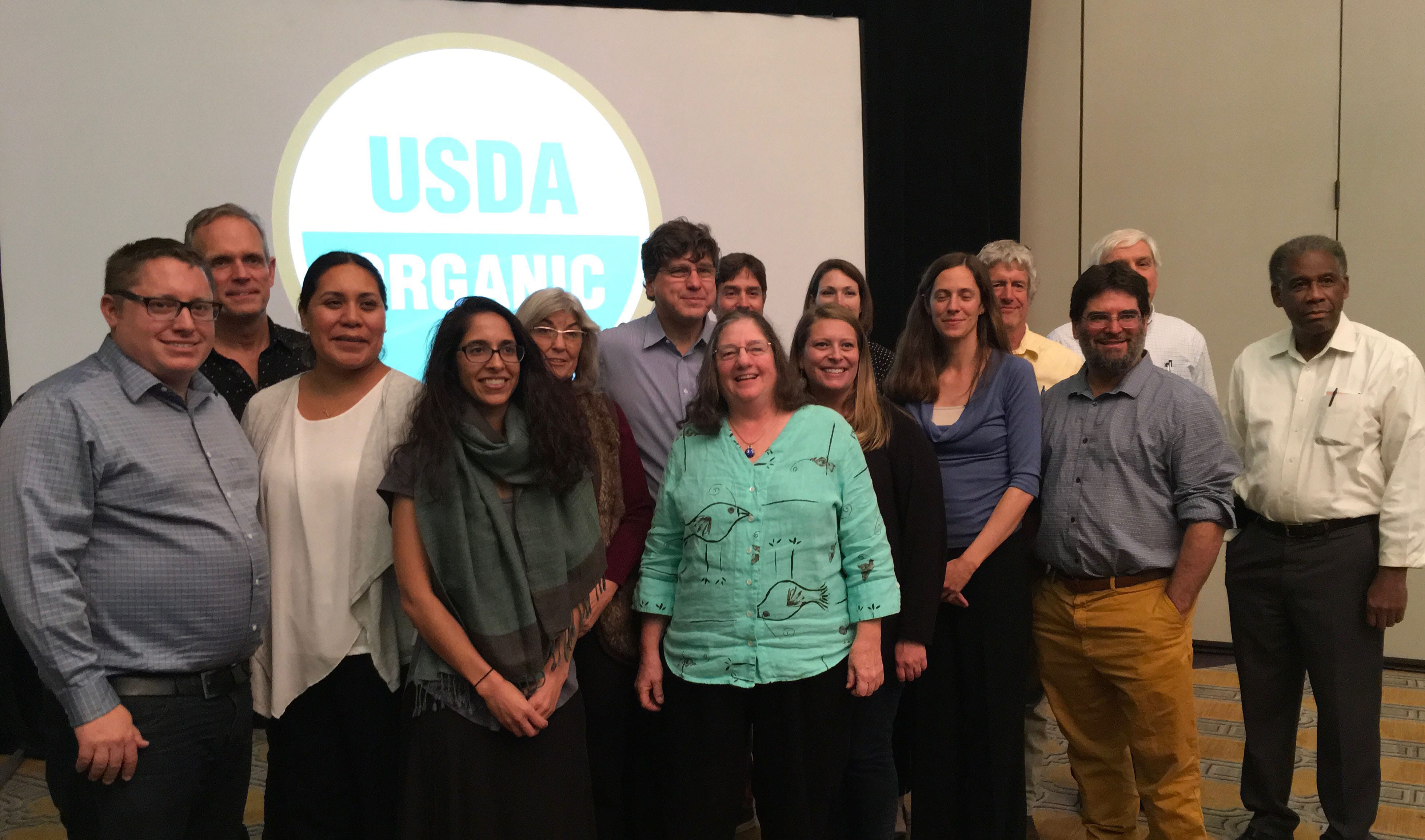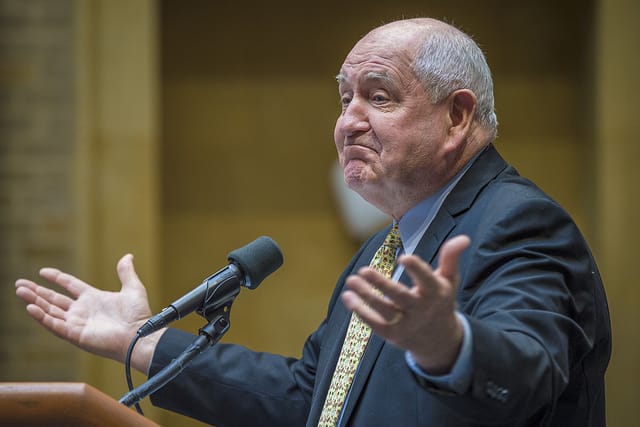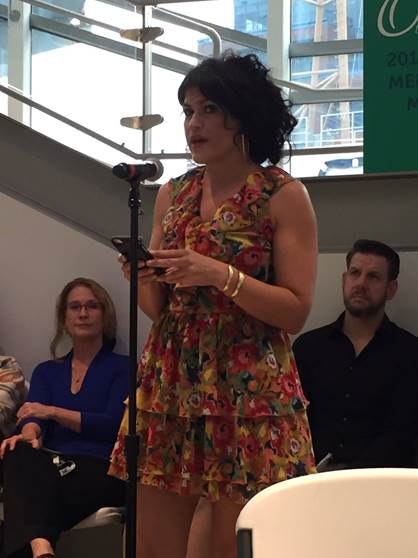Possibly the Least Consequential Meeting in Its 26-Year History
When members of the National Organic Standards Board (NOSB) assemble in Tucson later this week, it will be the first meeting since it has become painfully obvious to the organic community that their power, created by an act of Congress, has been almost entirely stripped away.
 |
Below: USDA Secretary Sonny Perdue |
 |
Unusual for a federal advisory board, the NOSB was endowed with specific statutory power by the Organic Foods Production Act of 1990 (OFPA), with its members appointed by the Secretary of Agriculture. The undermining of the NOSB’s authority began during the Obama administration, when it was stripped of the ability to set its own agenda. The agency has since been embroiled in ongoing litigation challenging the undercutting of NOSB power. Now, during the Trump Administration, NOSB decisions are being disregarded on a wholesale basis under USDA Secretary Sonny Perdue.
Prominent on the agenda at the spring meeting will be a review of the safety and essentiality of a number of non-organic materials for use in organic production and a discussion of long-overdue plans to crack down on documented fraud in the importation of organic feed grains.
Although successive Republican and Democratic administrations have paid lip service to the NOSB’s authority while frequently ignoring its recommendations, in a series of unprecedented decisions, Perdue has rendered the board’s expert advice nearly obsolete.
“The NOSB had recommended removing the approval of four non-organic materials for use in organic food production (conventional whey protein concentrate, Turkish bay leaves, inulin oligofructose, and the controversial and carcinogenic additive carrageenan),” said Mark A. Kastel, Codirector at The Cornucopia Institute, a Wisconsin-based farm policy research group. “Although thousands of public comments were submitted in support of the NOSB positions, a handful of letters from corporate lobbyists held more sway at the Trump/Perdue USDA.”
Congress mandated that the National List of non-organic and synthetic substances allowed for use in organics go through a careful review by the NOSB to assure their safety in terms of human health and the environment, and to declare that the materials are actually “essential.”
The NOSB determined that there were certified organic products that could substitute for the materials recommended for removal from the list. However, Perdue sided with the agribusiness lobby groups and the financially powerful interests that have invested in organics.
In an even more controversial move, Perdue also recently acquiesced to the wishes of lobbyists from the country’s largest operators of “livestock factories” by withdrawing a pending USDA rule that was ready to go into effect at the end of the Obama administration. The Organic Livestock and Poultry Practices rule would have set minimum standards for outdoor access for all organic livestock, forcing factory farm operations to comply with current regulations rather than keeping their animals in confinement conditions.
Kastel explained, “These materials decisions and the rule on organic animal welfare were years in the making through a collaborative process between the NOSB and industry stakeholders. Sadly, the voices of a few powerful corporations had more clout than the entire organic community.”
A number of organic farming and nonprofit leaders now question whether or not it’s worth investing their time and resources in the public-private dialogue at the semi-annual NOSB meetings if their input and the resulting NOSB decisions can be completely ignored.
This particular meeting is also controversial for another reason. Cornucopia has stated they are considering a legal challenge to the validity of any business that transpires at the meeting because the member composition of the board appears to be in violation of Congressional intent.
“The Organic Foods Production Act is clear,” said Anne Ross, a policy researcher and attorney at The Cornucopia Institute with an advanced degree in agricultural law. “Congress intended for this to be a very diverse body, reflecting the backgrounds of organic stakeholders. By failing, for the first time, to fill existing vacancies on the board, the current USDA leadership is undermining the diversity that Congress required in its deliberations.”
Dr. Francis Thicke’s term on the board as an environmentalist/resource conservationist representative expired in January. And, although the USDA went through the nomination and screening process, he has never been replaced. Subsequently, Joelle Mosso resigned from the board as one of the two handler/processor representatives. The USDA has made no attempt to fill that slot either.
“There’s a real question as to whether or not any business that transpires at this particular meeting will be legally binding, and we are researching that question right now,” said Ross.
Beginning in earnest under the Bush and Obama administrations, the USDA has undermined the balance of the NOSB. By filling slots that were designated for specific qualifications, like someone who “owns or operates an organic farm,” with corporate employees and members of the powerful industry lobby group the Organic Trade Association, the USDA has violated the intent of Congress, according to Cornucopia.
“As an example, a full-time employee of Organic Valley, the $1 billion-a-year farmer co-op, led the board in promulgating the recently withdrawn animal welfare/poultry rule,” said Kastel. “The member, who was also the NOSB Livestock Subcommittee chair at the time, was holding a seat reserved for an organic farmer.”
“Unlike Europe, which requires 43 ft.² outdoors for every chicken, the doomed rule she helped develop only required in anemic 2 ft.² outdoors and only 1-1.2 ft.² indoors—these are common conventional poultry industry standards,” he added.
 |
giant berry marketer Driscoll’s and 2016 Member of the Year of the Organic Trade Association, an industry lobby group. Although Driscoll’s grows no organic berries, Beck, who was one of the key NOSB lobbyists promoting hydroponic/soil-less production, held a seat reserved for someone who “owns or operates an organic farm.” |
Cornucopia recently helped two long-time organic farmers file a lawsuit challenging the USDA after they were passed over for appointment to the board in deference to agribusiness employees. The lawsuit stemmed from Carmela Beck, an employee of Driscoll’s, the country’s largest conventional/organic berry marketer, and Ashley Swaffar, an egg-industry employee, both being appointed to seats designated for farmers.
“Driscoll’s doesn’t even grow organic berries themselves, but rather contracts with independent California and Mexican farmers. Beck, an OTA ‘member of the year,’ actually manages Driscoll’s contractual relationship with their independent growers, according to documents obtained under the Freedom of Information Act,” stated Kastel.
Recently the two organic farmers, Wisconsin dairy farmer Rebecca Goodman and Ohio beef producer Dominic Marchese, lost their appeal when the courts decided they had no standing to challenge the USDA.
“It’s very disappointing that we never had a hearing challenging these corporate appointments in seats that were designated for working farmers, who actually have skin in the game,” said Marchese. “If we don’t have standing, and these agribusiness employees don’t really represent our interests on the board, as Congress intended, then the USDA can act with impunity.”
“Worse yet,” Marchese added, “neither chairman of the Senate Committee on Agriculture or the House Committee on Agriculture even cared to hold a hearing to question the USDA and the NOP administrator to ask about the sacredness of farm seats on the NOSB being given to non-farmer employees of Big Agriculture.
For four years, The Cornucopia Institute has maintained a scorecard rating the performance of NOSB members and separating the corporate-affiliated representatives from others who vote supporting policies recommended by the preponderance of nonprofit public interest groups that help oversee organic rulemaking.
“It’s demoralizing when grassroots farmers and other stakeholders invest in the process and so many NOSB members appear deaf to our voices. The Jacksonville vote [at the fall 2016 meeting] ignored the voices of the many farmers and organic advocates in favor of a few very large corporate players who would rewrite OFPA to create a new definition for organic,” said Dave Chapman, a Vermont tomato grower who helped mobilize the organic community against giant hydroponic (soil-less) operations labeling their produce as “organic.”
The majority of the board ignored Chapman and the nonprofit community and instead supported policies advocated by the lobbyists at the OTA. “After being away from my farm, taking on the great expense of attending numerous NOSB meetings, it is now obvious that, as a farmer, my voice does not matter. It is no wonder that so few farmers attend these meetings. NOSB members were only permitted to ask me two questions by the chair, while the hired representative of Driscoll’s, one of the country’s largest hydroponic producers, was allowed to testify to the board for half an hour. My time working with the board can no longer be justified,” he added.
Chapman and a number of the other pioneering organic farmers around the country are developing additional standards, including prohibiting hydroponics and “factory farm” livestock production, as part of what they are calling the Real Organic Project Label.
“Although our chief scientist and one of our attorneys/policy researchers will be attending the NOSB meeting, I will not be there personally, as has been my practice for over two decades,” said Cornucopia’s Kastel.
Cornucopia staff will continue to “witness” on behalf of the organic community and report the daily proceedings, in real time, on their website, Facebook page, and Twitter feed. However, the organization says that it is shifting resources to prioritizing and investing in marketplace education, enabling consumers to “vote in the grocery aisles” as the final arbiters in the effort to save the authenticity of the organic label.
“The good news is that, despite the corrupt relationship between the USDA and corporate interests in the organic arena, consumers can still find organic brands that truly meet their expectations by reviewing the organic brand scorecards on The Cornucopia Institute’s webpage,” said Kastel. “None of us are going back to eating conventional, nutritionally inferior food contaminated with agrichemical and drug residues.”
MORE: It was during the Obama administration, with Secretary Thomas Vilsack at the helm of the USDA and Miles McEvoy heading the agency’s National Organic Program (NOP), that the authority of the NOSB began to be undermined in a more systematic manner.
USDA political appointees amended the provision set up by Congress requiring a “Sunset Review” of all non-organic materials every five years. Previously, those materials were removed from the National List unless a two-thirds vote of the NOSB favored retaining them.
Vilsack and McEvoy turned that procedure on its head, leaving all non-organic and synthetic materials on the list in perpetuity and requiring a two-thirds vote to remove them. “In a board stacked with corporate-friendly representatives, that’s a threshold that becomes very hard to achieve if the industry is against removing a given material,” said Dr. Linley Dixon, Cornucopia’s chief scientist.
The unilateral reversal of Sunset procedures is currently being challenged in federal court by Cornucopia, Beyond Pesticides, Center for Food Safety, the Northeast Organic Dairy Producers Alliance, PCC Natural Markets, and nine other organic stakeholder organizations.
After the highly controversial Sunset debacle, Vilsack and McEvoy attempted to codify some of the unilateral changes they had announced in reducing the NOSB’s authority, including setting the board’s agenda and defining its work plans. They rushed through a major rewrite of the board’s Policy and Procedures Manual (PPM) that had previously been created during a long and introspective collaboration between the board and the public.
Dr. Barry Flamm, a former NOSB Chair who currently sits on The Cornucopia Institute Board of Directors, led the creation of the previous PPM. At the time, he said he was appreciative of the constructive input so many had in creating the positive working structure for the board.
Despite the corporation’s public pronouncements supporting organics, Tom Chapman, Clif Bar’s representative on the NOSB and current board chair, spearheaded the PPM changes that stripped power and independence from the board. “Ironically, the majority of Clif Bar’s sales are not even certified organic, but their representative is wielding great power in influencing how NOSB rulemaking impacts individual farmers and businesses that are 100% organic,” said Kastel.
As an example of the NOSB losing the power it had during most of the last quarter-century to set its own agenda, many board members and members of the public wanted the panel to look at requiring mandatory labeling of hydroponic fruits and vegetables at the upcoming meeting in Tucson. However, when the official agenda was posted in the Federal Register, the issue was not included.
According to Cornucopia’s NOSB scorecard, which tracks contested votes, the lowest-ranked current member of the NOSB is Sue Baird (appointed during the Obama administration as a “public interest/consumer” representative). Baird, an industry consultant who also runs an advocacy group, has only voted 10% of the time in consort with the positions of other nonprofit groups, reflecting her near unanimity with corporate lobbyists. Clif Bar’s Chapman, sitting in one of the handler/processor seats, was the next lowest rated current board member, with a 13% score.
“With the board stacked with corporate-friendly members, we really want to recognize and thank the highest rated independent voices on the NOSB representing the interests of farmers and consumers who want the working definition of organics protected,” said Cornucopia’s Dixon. “The champions of organics on the board are oftentimes put in an uncomfortable position challenging some of the most powerful entities in the organic industry.”
Emily Oakley, an Oklahoma organic fresh-market vegetable producer, has an 86% rating in the current iteration of Cornucopia’s NOSB voting scorecard. Dave Mortensen from Penn State, who holds the scientist seat on the board, follows closely at 80%, and Colorado farmer Steve Ela has a 70% rating.
With the lines clearly drawn between public interest and corporate voices on the NOSB, Cornucopia said it is bestowing their first “most improved” NOSB award to Jesse Buie, a Mississippi farmer, after his voting radically evolved from his first meetings.
Mr. Buie, with a 70% rating on contested votes during the spring 2017 NOSB meeting, joined with six other members of the NOSB dubbed the ‘Soil Seven.’ “These are board members who aggressively fought to protect the current legal standards requiring good soil fertility management before farmers can label their produce as organic,” stated Dixon.
“With the European Union further reinforcing their requirements for soil stewardship in organic systems, it will be interesting to see how this changes the United States’ equivalency agreements with other trading partners, including the EU, moving forward,” she observed.

